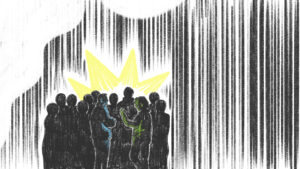“Come on, look at her. Look at how tight her skirt is. Look at how much cleavage she is showing. ”
Elsa could not believe it. She could not believe that the stranger who had inappropriately touched her breast while she had been waiting in line was now trying to blame it on her. On her outfit. On her office outfit – a blazer, a blouse and a skirt. She felt the security man glancing at her and wondered if he was thinking the same.
If he was taking her clothing as an excuse for sexual harassment.
We live in a society that is characterized by perpetuating sexual double standards and a mentality that blames the victims, especially when it comes to sexual harassment. It is commonly known that for example men can show off their bare torsos in the park, at the beach, on social media and it is considered to be socially acceptable. But when a woman is wearing shorts or a tight dress, when she is posting a picture of herself at the beach, literally showing any kind of skin, she is considered to be “cheap” and “easy to get”. Thoughts like “she was asking for it”, “she just wants attention” , “she must have a low self-esteem and needs the likes” or “Her social media says she wants it”often follow.
In recent years body positivity is a new topic which is explored more than before. People are more confident now, love to embrace and to present their bodies. People are more comfortable to wear whatever they feel like and love to express themselves in real life as well as on social media platforms, which is great.
However, with all that positivity there comes some negativity, too. Seeing all these photos seems to invite some individuals to leave horrible comments. Online slut shaming and name calling is part of the “new” harassment. Whenever a picture is revealing the tiniest bit of skin, some people seem to see an opportunity to drag down and blame the individual in the picture, especially when women post revealing pictures. While it is socially acceptable for men to post revealing pictures of themselves, mostly women have to face hateful comments, slut-shaming or inappropriate messages (yes, we are talking about dick pics here), that count as harassment.
While it is easy to say to “just not take and post those kinds of pictures“, it is necessary to talk about possible consequences for the victim. All these comments can lead to setting the profile private or searching for help within their family, to say the least. When comments and messages with hateful content add up, the likelihood of long term consequences such as decreased self-worth, increased anxiety or even depression enhances.
However, clothes never are consent. No matter, how much skin is showing, in real life or on social media, it does not mean that the person wants attention and it definitely does not mean that the person wants to be sexually harassed.
“I was not fully there. I had been drinking with my friends and you know how it is. You start with a beer and end up doing tequila shots. I was just so drunk, I would never ever do that while being sober” implies that the harasser is innocent because he/she/they was not fully aware of their actions. Excuses concerning alcohol or substance abuse are always replied in favor of the harasser, but blame the victim. Sounds crazy, but here is what we mean:
“She was drunk, and I mean like reeeeal drunk. I saw her and her friends doing shots of tequila before and dancing really excessively. She was leading everyone in the room on.”
Shocking, right? But it is what has been happening for ages. We do not blame the victim of a robbery or a fight.
However, when it comes to sexual harassment blaming the victim still seems to be the easiest explanation.
So instead of believing the victim, a person, who experienced traumatizing events, society keeps on blaming the individual. Sexual harassment takes place in a work-setting, which is bad enough as it is and we will thematize it in a follow-up article. However, you will find harassers/abusers trying to justify their actions by sentences such as
„Maybe she is just a bit sensitive. It meant to be a joke, it was not that big of a deal”.
Maybe it was a joke to you, maybe your colleagues laughed. But you keep going on with your life, you do not spend hours on thinking of what happened or if something is going to happen again. Work is supposed to be a safe space, where people are working together in order to achieve a goal together and to earn their living. Work is not supposed to put people through emotional hell.
Think ahead. Put yourself in the victim’s shoes. The person probably spent a huge amount of time and consideration in order to report the harassment. Trying to excuse discriminating and abusive behaviour with humour just shows a lack of empathy and humanity. Making comments with sexual content is also very inappropriate and unprofessional, especially at work. So instead of excusing behaviour to be a joke, maybe try to say sorry and change your behaviour.
“The victim took so long to report it. How can we believe that harassment actually happened?”
The first thought one might have is “Yeah that actually makes sense. What took the victim so long? Why the person speaking up now?”
When you have to go through a traumatic experience, you do not realize the severity of the situation immediately. Of course, the extent of harassment and its consequences varies and depends on factors such as the vulnerability of the victim, stress level, situation, type of harassment, and so on. So maybe the victim does not realize that the experience was as bad as it was because of subconsciously using denial as a coping mechanism. As time passes by and the victim rethinks what has happened and opens up to other people about it. The realization, that this kind of behavior can not be tolerated, might arise. While it might take some time to realize what happened, it is also very likely that the victim needs even more time to gain the self-esteem and strength to talk about it since it is a traumatizing experience after all. Different people need a different amount of time.
Instead of questioning their credibility, we should reinforce victims to speak up and validate their feelings.
“Men just can’t help themselves. I guess, boys will be boys after all.”
This excuse is based on sexual double standards, which indicate that having a certain amount of sexual encounters and frequent sexual activity is socially accepted and somehow expected for men, but not for women
[1].
Furthermore, it is using biology to justify unacceptable behaviour. It is commonly known that increased levels of testosterone affect the behaviour towards being more aggressive [2], and less friendly [3]. This effect is influenced by factors such as trait dominance or levels of cortisol [4]. However, testosterone alone does not restrict the executive functions, which include impulse control, in the intensity that one completely loses it.
So why are we still using it?
Some argue that victims use it as an attempt to understand what has happened to them and why especially loved ones would show sexually harassing or abusive behaviour [5]. While this is a way of coping with a traumatizing experience, excusing harassment because of the weak effects of biology just does not seem right. It implies that humans are driven by their basic instincts, lack empathy and the ability to draw possible conclusions of their own behavior. But this is what makes us human, right? The ability to think ahead? To put ourselves in someone’s position?
“It was just too crowded”
This happens especially in public transport, movie theater, club, or any fair where there is a long queue or crowd. In a crowded place, people can push you by mistake or touch hands, but groping and touching vigorously by mistake are logically not really possible. Especially women are facing this issue in a lot of places.
In a crowded place it is quite difficult to catch and identify the person who harassed you which can lead to a lack of support for the victim because of a lack of evidence. While some places have cctv for further investigation, oftentimes there is no opportunity to detect the harasser.
Some may even see harassment and still not help the person. This is a psychological phenomenon called “The Bystander Effect”, where a crowd lacks responsibility. As the number of individuals in a group increases, personal feelings of being accountable and taking action decrease. The pressure to help the victim slowly vanishes and every individual thinks that the others might help which often ends in no one taking action.
Even if the victim screams, people may brush it off as a mere crowded place incident. “It was too crowded”, “there is barely a place to stand properly” “Just be a little patient” thinking the victim is being entitled and complaining about the crowded place. But a victim talking about feeling uncomfortable should be enough. A victim knows the difference between a “good touch” and “bad touch”. A crowded place should never be unsafe for anyone.
“They (abusers/harassers) are just socially awkward”
Going out to places such as clubs or bars is a fun activity if personal boundaries are respected. However, it can turn into a nightmare, when people lack social skills and empathy. Nevertheless, a lack of respecting boundaries is often excused with social awkwardness.
What is that even supposed to mean?
Being socially awkward means that one is bad at reading social cues, that one is misunderstanding body language and facial expressions or that one can not carry on small talk. It is not bad to be socially awkward, since social situations and human interaction can be scary and confusing. However, if you know that you are not good at interacting with other people because you have experienced rejection by others and you are uncomfortable in social situations, maybe do not push yourself too hard. If you want to flirt with someone you do not know, maybe get help from a close friend and train your dialogue before you actually speak up.
“It was just a compliment. The victim is being way too sensitive”.
Compliments are subjective. What might seem nice and appropriate to you or what sounds good in your own head, might be offensive to the person that you are trying to give a compliment to. Furthermore, compliments often focus on attributes that are a given, for example on someone’s eyes or body. For starters: Complimenting on things that one is barely able to change is not a good compliment. When you are complimenting on given attributes while using inappropriate language and sexual vocabulary, you are reducing people to their sexuality. Instead of making comments like “nice ass” or “wow, you are hot”, try to emphasize things that the person has control over, like “I really like, when you are wearing your hair open” or “the colour of your lipstick really makes your eyes pop”.
What are we taking away from all this?
Excuses seem to always be about the victim. As a person who experienced sexual harassment, you can basically never do anything right. You are showing too much skin, drinking too much, taking too long to report. But your feelings do not seem to be valid at all. You are too sensitive, your skin is not thick enough, you just do not have humour.
This victim-blaming mentality seriously needs to stop. Why are we still blaming victims for their own trauma? Why do we live in a society that perpetuates pointless and imbecile excuses? Because it is easier? Because sexual harassment is a taboo and talking about what happened and still happens to millions of people takes so much time? Because, as an outstanding person, it is not our business?
It is our business. Every single day.
The chances are high that every one of us got harassed. The chances are even higher that every one of us knows someone who got harassed. So we need to talk about this. We need to know how to deal with it. We need to know how to prevent it. And we also need to know that there is no excuse on this planet that justifies crossing the personal boundaries of another human being.
Authors: Ilka Reichelt & Nafisa Islam
Sources:
- [1] Endendijk JJ, van Baar AL, Deković M. He is a Stud, She is a Slut! A Meta-Analysis on the Continued Existence of Sexual Double Standards. Personality and Social Psychology Review. 2020;24(2):163-190. doi:10.1177/108886831989131 0
- [2] Birbaumer N., Schmidt R.F. Biologische Psychologie, DOI 10.1007/978-3-540-95938-0, © Springer Medizin Verlag Heidelberg 2010
- [3] Lozza, N., Spoerri, C., Ehlert, U. et al. Predicting Social Behavior: Basal and Dynamic Joint Effects of Testosterone and Cortisol. Adaptive Human Behavior and Physiology 3 , 255–274 (2017). https://doi.org/10.1007/s40750-017-0069-9
- [4] Carré JM, Archer J. Testosterone and human behavior: the role of individual and contextual variables. Curr Opin Psychol. 2018 Feb;19:149-153. doi: 10.1016/j.copsyc.2017.03.021. Epub 2017 Apr 6. PMID: 29279215.
- [5]Weiss KG. “Boys Will Be Boys” and Other Gendered Accounts: An Exploration of Victims’ Excuses and Justifications for Unwanted Sexual Contact and Coercion. Violence Against Women. 2009;15(7):810-834. doi:10.1177/107780120933361 1






No comment yet, add your voice below!